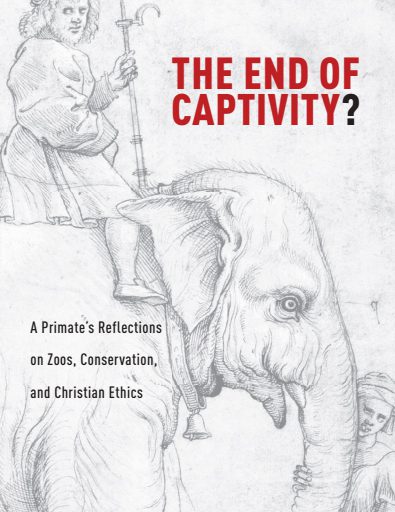 (Photo Courtesy of Tripp York)
(Photo Courtesy of Tripp York)
Today, I have the privilege of interview my friend, fellow Trevecca alum, and author of one of my favorite books ever (The Devil Wears Nada), Tripp York, about his latest book, The End of Captivity?. Much like his former professor, Stanley Hauerwas, Tripp doesn’t hesitate to tackle controversial subjects in an open, bluntly honest, sometimes salty, and surprisingly (if you don’t already know him) funny way. In his latest endeavor, Tripp “addresses how we talk about the good of other animals in light of a stark impossibility: their freedom from us. While all of us in the animal (and plant) kingdom are interdependent upon one another, humans are unique in that we are the only animals who keep other animals captive. We keep animals in zoos, sanctuaries, circuses, conservatories, aquariums, research facilities, slaughterhouses, and on our farms and in our homes. York asks what such forms of captivity say about us, and how animal captivity shapes what we imagine to be the purpose of other animals.” Check out my interview with Tripp below, then do yourself a favor and pick up a copy
of The End of Captivity? today.
Here’s the thing I hate about reading your books: they always make me rethink my assumptions. Why, sir, should I bother rethinking things I’ve already got figured out? Isn’t that a sign of weakness?
It’s a sign of greatness, my friend. Especially if you’re reading some bit of nonsense I’ve written. Thanks for funding the cause, brother.
You talk in The End of Captivity about the stark impossibility of animals’ freedom from us. But isn’t that their fault for selfishly wanting to live where I want to build my new house?
Hahaha. Exactly. What a bunch of assholes, right?! Speaking of which, coyotes are making downtown Chicago their new home. Maybe the Cubs will become the Pups. Can’t hurt.
In Chapter 4, you say that in naming animals “we narrate, for other forms of life, how those animals are going to exist (or not exist) in this world. We determine, for all other animals, how they are going to relate to us. We also determine how they will live and die. It is in this fourth form of naming that we exercise greatest power in relation to other living beings.” Now, I thought that was one of the great things about being human: dominion over nature!! But then you go on to say I shouldn’t use my God given dominion to exploit nature and animals even though it says so right there in Genesis. Tell me, why do you hate the Bible?
Oh man, you’re killing it today. I love the Bible. It’s such a scandalous book, and naughty too. Did I ever tell you I once did a one-person adaptation of the Song of Songs? That’s a story for another day, I guess.
Yes, we are the privileged species in that we are, as Andrew Linzey notes, the servant species. Our lovely dominion is rooted in caring for that which is a gift and does not belong to us. It’s like this (I think I am getting this example from Bill McKibben): I grant dominion to my babysitter when the babysitter is watching my child. I fully expect my child to be completely intact upon my return.
Actually, I don’t have any children. I do have a beautiful blind Siberian husky and a very temperamental and, rather, ‘niceness-challenged’ cat. The dog sitter damn well better make sure my dog is better off upon my return than how I left her.
I’m not quite as concerned about the cat.
I may be misreading you, but if even an animal sanctuary raises ethical questions, then it would seem that killing and eating animals would also raise ethical issues. So, if Christians should seriously rethink our relationship to animals and our reasons for keeping them in captivity in order to live in a more peaceable kingdom, then should Christians also consider becoming vegetarians?
I’m not sure how a Christian doesn’t, at bare minimum, consider vegetarianism (at least those of us in very affluent parts of the world). Given the directive in Genesis to eat the fruit of the trees, and given the eschatological nature of Christianity as rooted in Isaiah with the depiction of God’s holy mountain, the Noahic covenant, and the covenant made in Hosea, then, yes, at the very least, it must be considered. What MUST also occur, again, at the absolute bare minimum, is a refusal to consume factory-farmed animals. Anyone who eats animals from slaughterhouses has literally said, “I do not care about our earth, our water, our soil, our oxygen, our trees, nor do I care about the billions of animals systematically tortured, confined, maimed, and destroyed, nor do I care about what I am putting in my own body—which is supposedly a temple for the Holy Spirit.” Talk about bad theology! Not to mention a person who is participating in the single most destructive practice toward the planet. I can’t tell you how many times I have almost died, literally died, laughing when meeting someone who claims to be an environmentalist and, yet, eats animals from slaughterhouses (which is almost all animals you will consume at restaurants and grocery stores). Granted, a lot of these people are academics—which, I know, you can’t expect much from them, for sure, but still . . . come on. But on this point, I’m not so much concerned about whether or not you’re an environmentalist, I just want to know how a Christian can possibly justify participating in one of the most barbaric and violent edifices that’s ever been created. It’s a principality and power that is destroying the earth and its resources, while complicit in the starvation of people in poorer countries. Eating animals from slaughterhouses is not just theologically and environmentally suspect, it’s a form of environmental racism that takes resources away from poorer countries so that we can gorge ourselves on cheap, hormone-injected animals that we see as nothing more than soulless objects to be flushed down our toilets. Talk about a shitty theology of creation.
See what I did there?! See?! Did you catch it?! Aaahhh…
In Chapter 6 you say, “Christians are being out-narrated by individuals who seem to have a more faithful understanding of what it means to live peaceably than those within our own tradition.” Personally, I can probably count on one hand the number of Christians I know that are serious and passionate animal advocates (you being one of them). Why aren’t there more Steve Irwins in the Church? Are there just not enough Australians on our church’s membership roles?
God love those Aussies. (Sorry, Bret and Jermaine—New Zealand doesn’t count.)
It’s because many within the church have an impoverished account of creation, not to mention what the slightest idea of taking eschatology seriously would mean. We should be at the forefront of caring about these issues, as well as seeing how they are connected to other pertinent social justice issues (eco-feminists have been all over this from day one—the connections between conservation, what we eat, and how that’s connected to misogyny and environmental racism are tight).
I’m just not sure how someone who imagines creation to be good can be so indifferent to, well, not only the plight of rhinos and bongos, but cows, chickens, and salmon. They are not only our biological kin, but, according to scripture, they are our covenantal kin. My guess is that most Christians don’t actually believe such a claim because, if they did, they would show it. They’d live it. I think many Christians are atheists on these matters. Granted, I’ve met far more atheists concerned with the good that is creation than Christians, so I guess calling Christians ‘atheistic’ on this topic is not going to accomplish what I want it to accomplish. Good for the atheists!
Ok, fine. I’ll admit it. Zoos sometimes make me sad and I don’t just mean the overpriced concessions. It’s sad to think about the fact that animals meant to live in the wild are now held captive in a relatively tiny amount of space. As a Christian, should I support my local zoo or should I sneak in at night and set the captives free?
What? An actual question about zoos?! Ha! For your readers, I only spend one chapter on captive animals for food. The rest is about zoos. So, you know, all you omnivores out there, check out my book. I promise it’s not obnoxious (I really, really, really hate talking about vegetarianism/veganism—I’m much more interested in the role zoos and sanctuaries play in our imaginations and in reality).
And, no, definitely do not liberate the animals in your local zoo. Personally, I’d rather not find out that tigers and mandrills are roaming my backyard. Mandrills will ‘eff you up. But, of course, this leads us to the larger point: there is very little wild left for many of these animals to return. Indeed, some animals in zoos end up there because they were going to be culled or killed. Loss of natural habitat is the enemy, and that’s all on us.
Bonus Question: If God wants us to live peacefully with animals and presumably not eat them and yet God made bacon delicious, does that make God complicit in evil?
In terms of bacon: man, this is like a theodicy question for all the little piggies in the world! I can hear Babe saying, “Why did you make us so yummy, God?! Why?! Why do you hate us so much?!” I’m guessing for pigs, God is not the giant pig in the sky.
Then again, God does say, like, 342 times, TO NOT EAT PIGS.
Poor ancient Israelites—had they only known that God was going to eventually change God’s mind on that one . . .
Tripp York, PhD teaches at Virginia Wesleyan College in Virginia Beach, VA. He’s the author or editor of 11 books—some of them even readable. He enjoys surfing all the knee-high waves of the not-so legendary East Coast and thanks punk rock for saving his life.
WEBSITE: http://trippyork.com/
CLICK HERE to pick up a copy of The End of Captivity
















